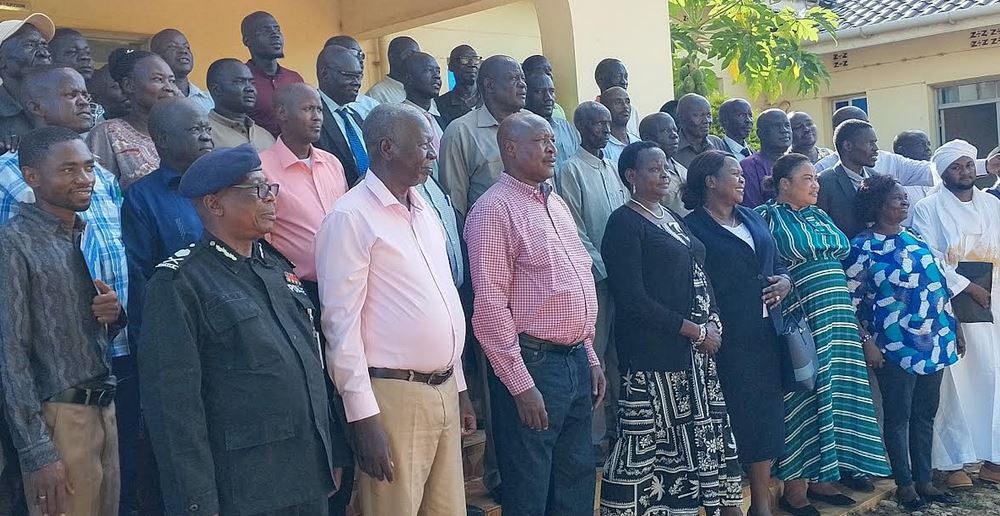Eastern Equatoria State Governor Louis Lobong Lojore has threatened to shut down the offices of traffic police in Torit because the officials claim the revenues they collect are remitted directly to the national government in Juba.
The governor gave a one-week ultimatum for the national traffic police to provide documents proving their claim of sending money to Juba otherwise he will eject them from the state and only deal with the state police who adhere to the state’s policies.
Governor Lobong also gave a one-month ultimatum to the Insurance Regulatory Authority to start collecting and remitting revenue to the state or face closure.
This came during the closing ceremony of a three-day tax harmonization workshop in Torit organized by Eastern Equatoria State Revenue Authority with support from UNDP on Friday.
The workshop brought together nearly 100 stakeholders from across the eight counties of the state under the theme “Improving revenue mobilization for effective implementation of public finance management reforms in the state.”
“I never knew that we have traffic police here for national (government) and they are collecting money. I do not know about that and I have not got any correspondence like that and that is the reason I called the police commissioner here. I am now giving seven days to the traffic police who think they are answerable to Juba to bring an official letter that shows they belong to the national government and they collect and send money to Juba,” he charged. “After that, I will close the office here since you belong to the national government, pack and go and you will never collect money here and we will train our police here. The offices they are working from belong to the state and we bought the only vehicle that they use for the traffic police, so, if you are for the national government, then what are you here for? You are thieves! I know that money is going nowhere and does not reach the national treasury as they claim.”
Lobong added: “I am very serious about this issue because they cannot come and collect resources from this state and take them somewhere without my knowledge, without any document.”
For his part, Maj General James Monday Enoka, the state’s police commissioner, said there was a need to respect the rule of law and have clarity on whether the country has a centralized or decentralized system of administration.
“The problem is the checkpoints because there is no mandate by the national government to collect any money except those that are mentioned for the services and operation costs. This collection at the checkpoint is a different thing and they are not authorized to collect the money,” he explained” I have been here for two and half years and I have not authorized the police to collect money but of course, we give strong orders of the security committee and the governor. Eastern Equatoria is at least the best state because the checkpoints are few but in other states, there are over 20 checkpoints.”
Gen. Monday however admitted that when he visited Kapoeta with the minister of local government to investigate what the police officers at the checkpoints do with the money collected, they found out that they distribute it among themselves.
“We have a strict code of conduct for all the organized forces but the situation down there is beyond our control and if you want to dismiss them, you will dismiss the whole force, all the forces frankly speaking,” he added.
Meanwhile, Mary Alphonse Lodira, the deputy governor, clarified that the country is under a federal system of government and urged transparency in revenue issues.
“This country is under federalism and every state has to do its things. This is a good step because corruption must stop, especially bribery on the roads,” she said. “In handling government issues, we should have integrity and transparency.”
On his part, Geoffrey Von Otto, the Executive Director of the State Revenue Authority, said the workshop resolved to stop providing operational costs for counties that do not remit revenues to the state headquarters.
“Only state law firms shall be allowed to process land or property fee agreements with professional fees of 5 and not 10 percent. Failure to comply will be followed by closure. All land brokers must be registered and licensed to ease and track the sale of land and other properties in the state,” he said. “On the issue of vehicle licenses and number plates and log books, it was found out that failure to enforce good collections from the state traffic police is because they ignore and undermine state tax policy guidelines. The national traffic police impose their gadgets on the state traffic police as such all their collections are remitted to their headquarters in Juba.”
He added: “It was recommended that there is a need to introduce state-level issuance of driving licenses, that the state government should print its documents to reduce interference from national institutions, and that there is a need for a high-level decision to address issues of command and engage the national police traffic and the national civil defense services.”




